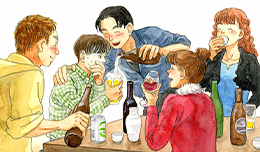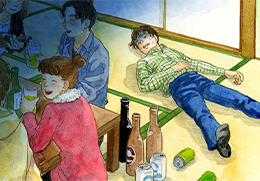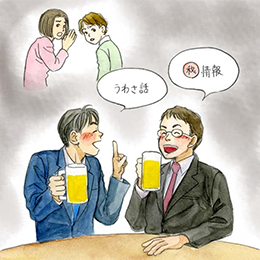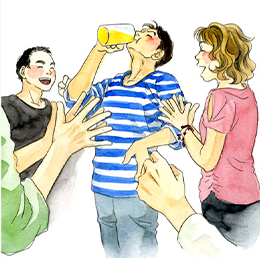Communication Risks: Let's learn how to say no
Alcohol-related harassment is a violation of human rights
The term “aluhara” stands for alcohol-related harassment, nuisance behavior, and human rights violations linked to drinking alcohol.
Forcing someone to drink
This is when someone is forced to drink alcohol under psychological pressure, such as through the use of superior-subordinate relationships, club traditions, peer pressure, or punishment games.

Forcing someone to drink in one go
This forces people to drink in one go or compete to see who can drink the fastest in order to liven up the atmosphere. The terms 'Iki-nomi' and ‘sokunomi’ mean drinking in one go.

Deliberately getting someone drunk
This is forcing someone to drink in an unreasonable way to get them drunk, knowing that they are not strong drinkers.
Forcing someone to drink or goading them into drinking is a dangerous act that can even threaten their life. If they suffer from acute alcohol poisoning, you could be charged with “accidental injury,” and if they die, you could be charged with “accidental homicide.”
Also, if you let a drunk friend die without providing them with the necessary care, you could be charged with “abandoning a person in your charge resulting in death.”
Lack of consideration for people who can't drink or don't drink
Examples include encouraging someone to drink alcohol despite their constitution or wishes, not providing any drinks other than alcohol at a party, and making fun of or insulting someone for not being able to drink.
Annoying behavior under intoxication
Examples include getting into fights when drunk, playing pranks, using abusive language or violence, sexual harassment, and other offensive behavior.
Sources
Iki-nomi Prevention Liaison Council “5 Definitions of “Aluhara” “Iki-nomi Jurisprudence”
Carelessness is not forgiven
When you drink alcohol and your senses become numbed, you tend to speak loudly. Even if you think you are acting the same as usual, those around you may find it annoying. Also, when you drink alcohol and your mind becomes relaxed, you may carelessly talk about confidential information, slander, or gossip. Even on the train or taxi ride home, be conscious of your actions at all times and make sure you are behaving in a way that is appropriate for a professional adult.
Annoying behavior done “because you’re drunk” or “while tipsy” cannot be forgiven as a bit of fun, and you may end up hurting someone without realizing it. To avoid becoming a victim and prevent others from becoming victims, let's drink alcohol smartly and properly.

Even if you drink alcohol, you should still follow the rules.
The appropriate amount of alcohol differs from person to person. You should not force alcohol on people who are not able to drink.
Even if you are at a party where drinks are served, you should not use alcohol as an excuse to break the rules and make a racket, as this may offend the people you are drinking with. As a member of society, you should always try to behave appropriately.
For example, if you drink a large amount of alcohol at once, for example by chugging it all in one go, the alcohol concentration in your blood will rise rapidly, and you may suffer from acute alcohol poisoning. You should never try to liven up the atmosphere by chugging alcohol yourself or forcing others to do so. Refrain from behaving in a way that annoys others, such as getting drunk and saying or doing inappropriate things.
In addition, forcing people to drink or touching their bodies inappropriately is also considered harassment. Women who are pregnant or breastfeeding should not be encouraged to drink alcohol, as it could have an adverse effect on the baby.

If you are forced to drink
There will be times when people who don't drink, don't want to drink, or can't drink due to their physical constitution will be invited to join in drinking sessions.
Whether or not you drink alcohol is a personal choice, so if you are forced to drink, don't be vague about it. Have the courage to say “I don't drink,” “I don't feel like drinking today,” “I can't drink alcohol because of my constitution,” or “I can't drink because I'm sensitive to alcohol.”
Being unable to drink alcohol or not drinking alcohol is not a bad thing, nor does it mean that you can't read the situation.